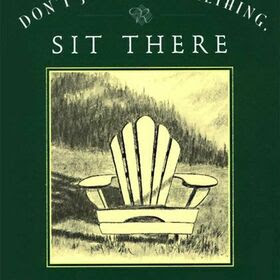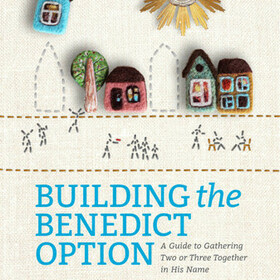Don't just do something, sit there

Earlier this week, my friend Alex asked me if I was a reader. I said “not really,” and he laughed: behind my head in Zoom videos are twenty or so books in a stack. I read two books of them this week. They’re the ones linked below. I found them at a book swap in Salem. I figured that I needed to give the “Benedict Option” a fairer shake, and while I wouldn’t support its author and doubt its wisdom, I couldn’t say no to a free book. Then, I saw the best book title:
Don’t just do something, sit there.
You can judge a book by its cover. And what’s not to love about that one? As an inverted idiom, it’s fun. And of course it would be a book about mindfulness practice. It went in the bag right next to the Catholic one. I added The Way of Zen and The Sea is My Brother for good measure.
I think that I a too-high standard for books about my religion. The practical handbook for building Christian communities left a lot to be desired especially as a defense or explanation of Rod Dreher’s thinking. My standards for other books are lower. Perhaps it’s because I don’t expect them to be right and any wisdom I glean is a bonus. All that to say, while the Catholic book was a frustration, Don’t Just Do Something, Sit There was a delight.
The author swept aside concerns of needing to understand or accept Buddhist cosmology from the outside: practice mindfulness, she said, and you’ll benefit whatever your other beliefs. (Our Catholic author made the inverse claim: none of her practical wisdom would be all that useful if you aren’t a Catholic.)
At the beginning of the book were a few thoughts (from the Buddha) that stuck with me:
the mind becomes confused and fatigued chasing pleasant experiences
mindfulness is a relaxed, non-clinging, non-aversive awareness of present experience
mindfulness is adding to the present moment only our calm attention
I kept asking, with my pencil in the margins, what does my smartphone do to this or that mindfulness practice? In every case, the phone undermines the practice or worsens the underlying condition. If this were written today, the author’s opening section would be about how many hundred of miles to leave behind one’s phone en route to a meditation retreat. Calm attention to the now must exclude tapping on our small glass rectangles. (At this point in the reading, of course I looked up dumb phone options using my smart phone.)
Moments to pause, be still, and grow in awareness are precious and should be sought after, not avoided. But my mind inevitably cannot be still.
Much of my work and leisure is chasing pleasant experiences and avoiding unpleasant ones. (My email inbox can attest to the latter.) The level of energy that takes is draining in the macro, but in the micro I’m always after a new tab, new alert, or refresh to see what else interesting might have occurred since I checked last. A moment to focus on what’s actually happening can almost never be spared. After a day of such frenetic mental activity, I relax mostly by continuing the onslaught of new visual stimuli.
Don’t Just Do Something, shows how a complete reversal of that mode can be achieved. Interestingly, by the end, the author swept you into some of the more intense and deeply held aspects of Buddhist cosmology. The assumption seemed to be that once you have the benefit of their practices, the rest of their beliefs will naturally follow. I kept wondering how much better our Christian writers and teachers might fare if they made a similar gambit. Why not start with the examen or lectio divina?
